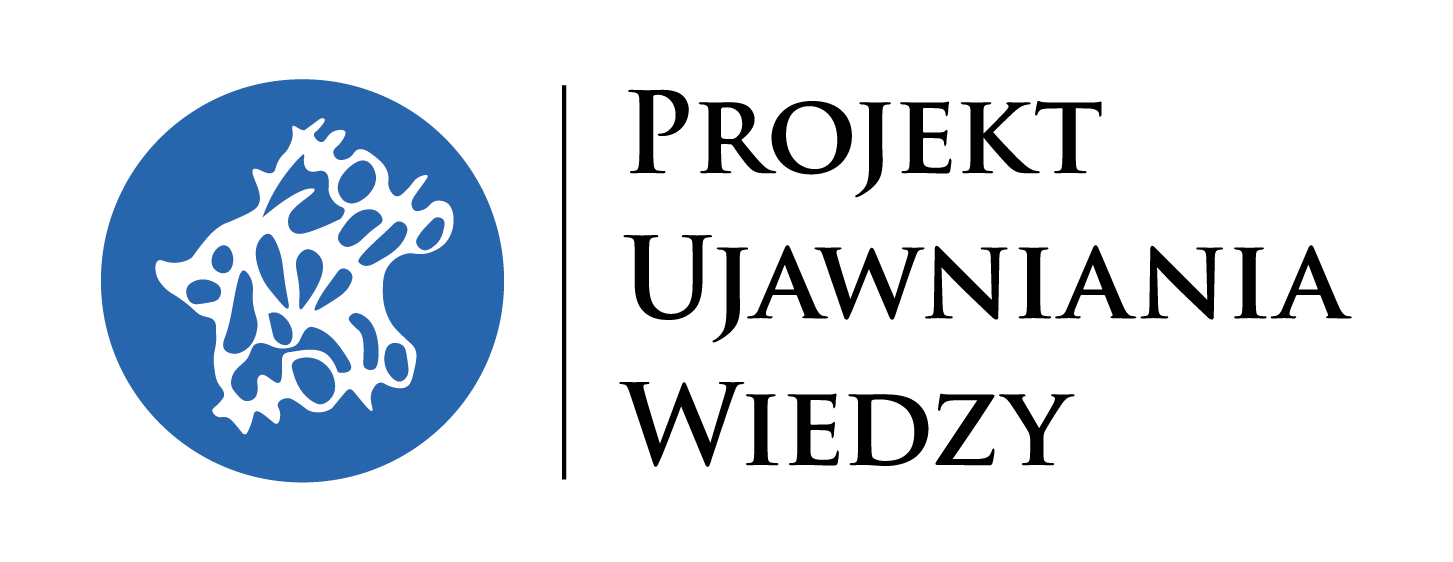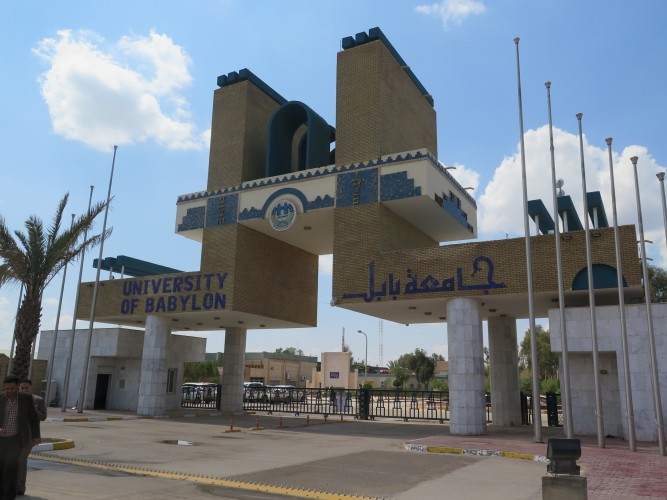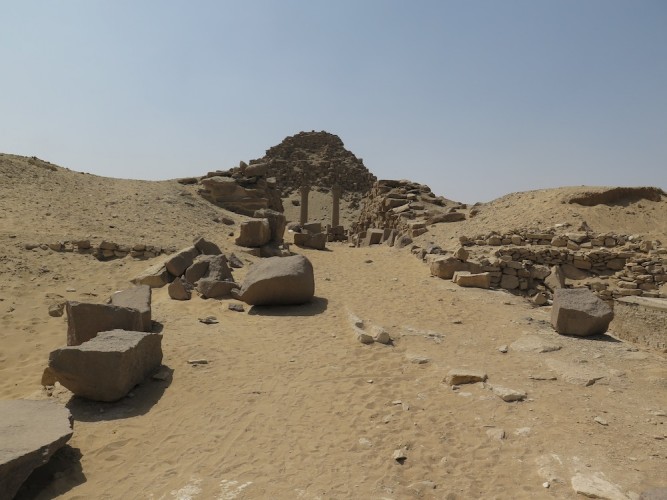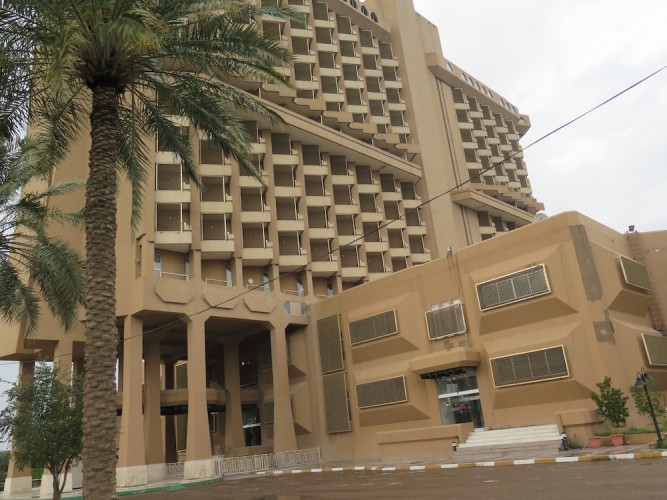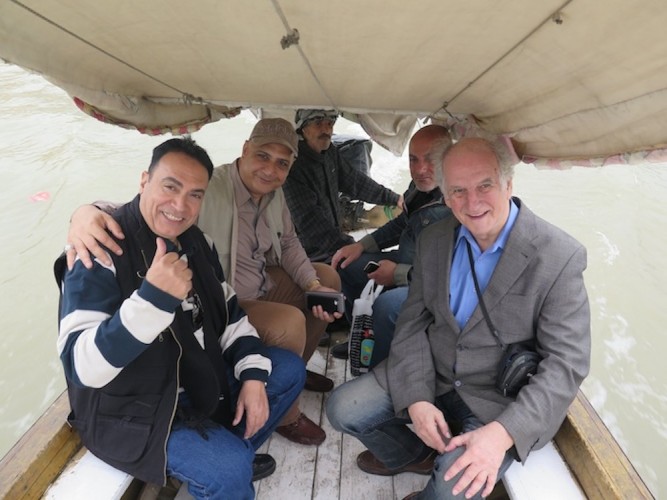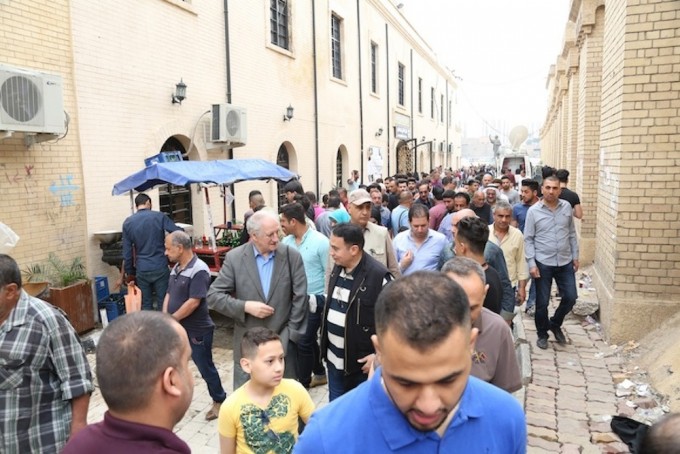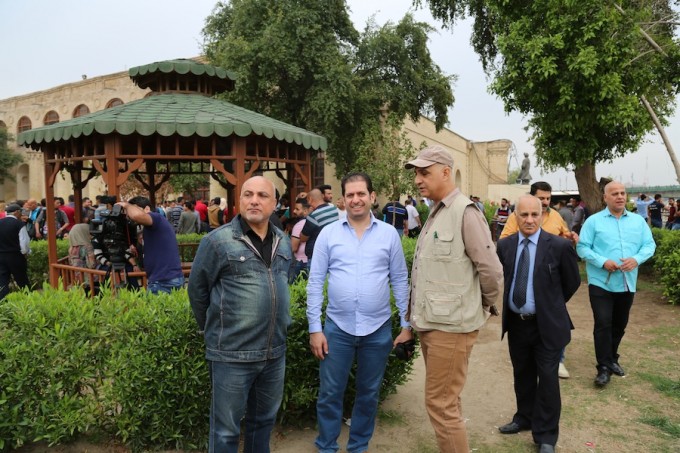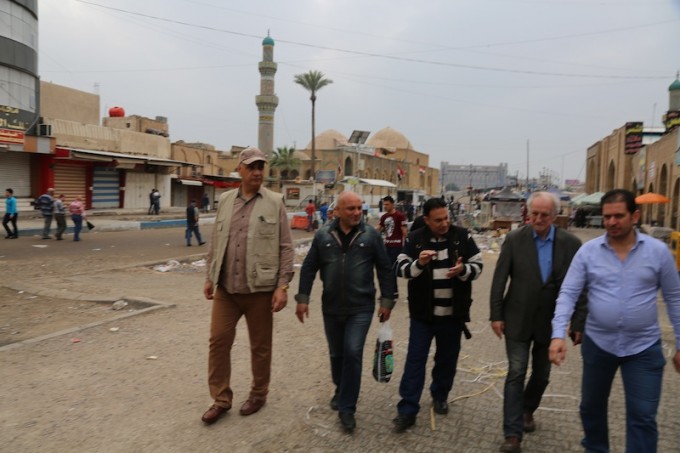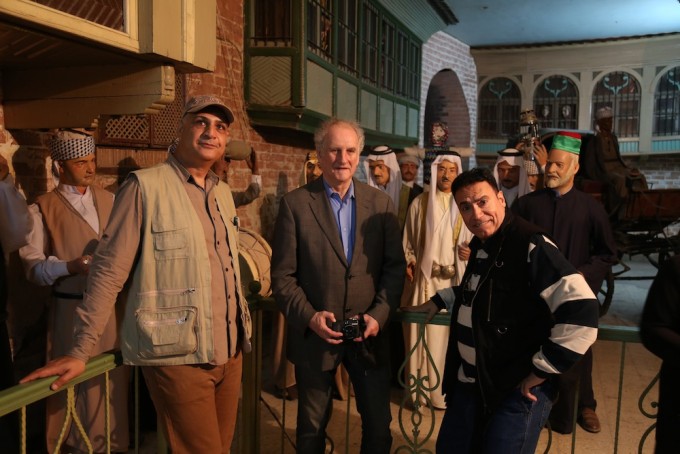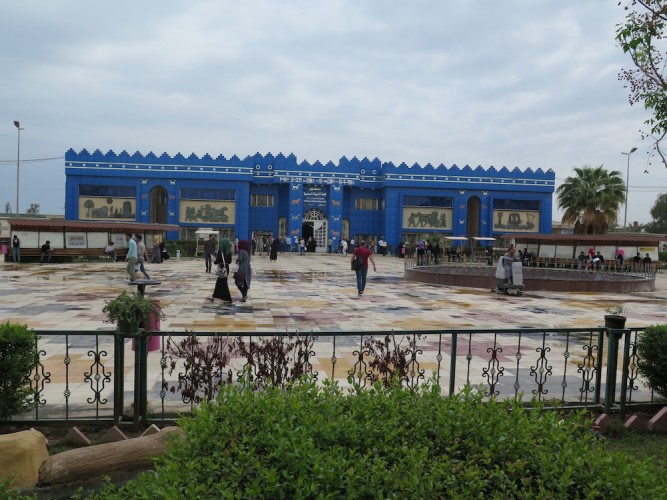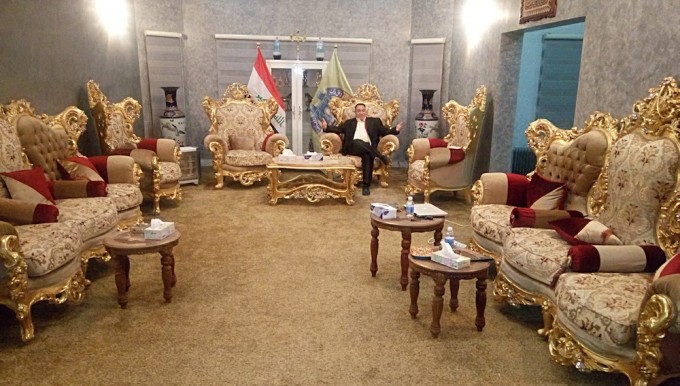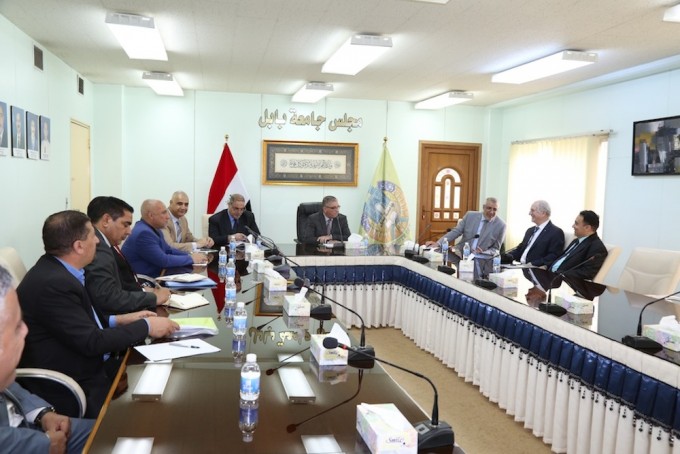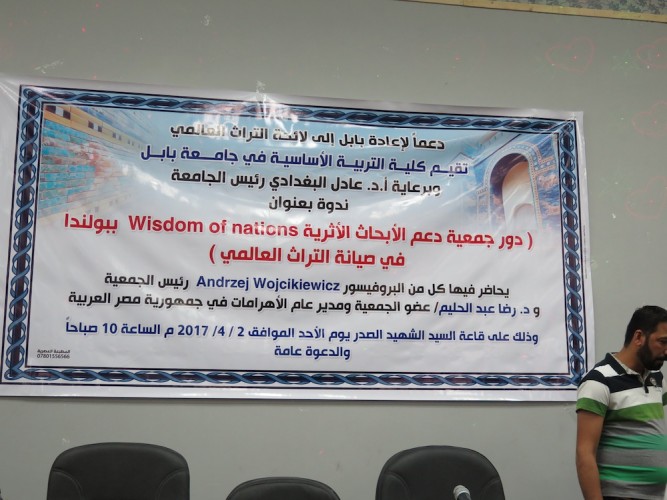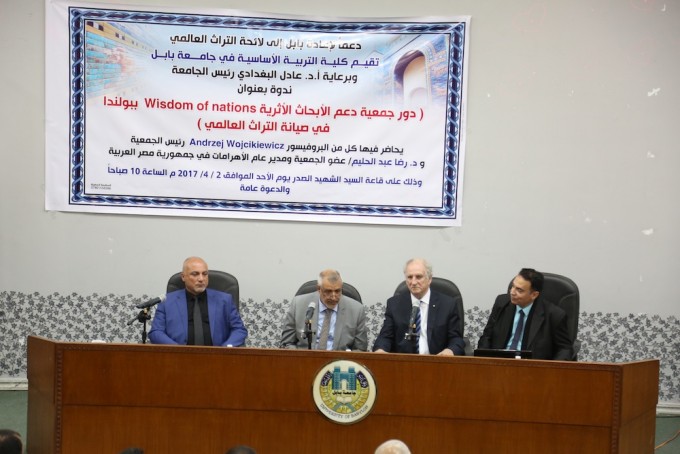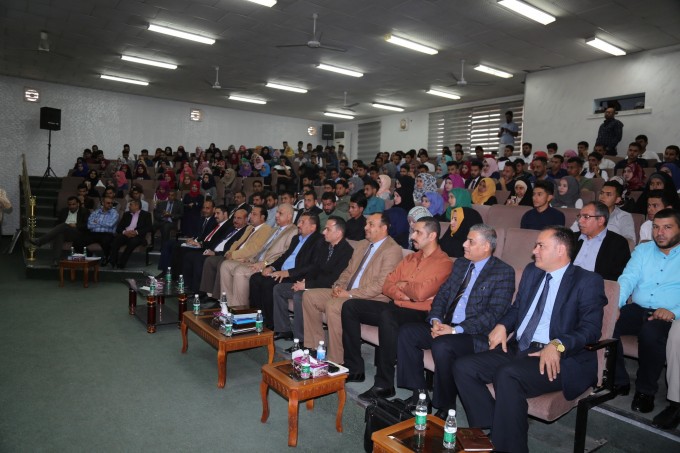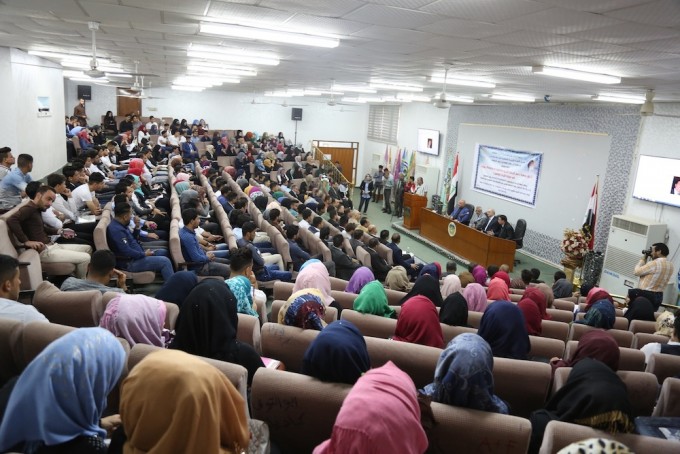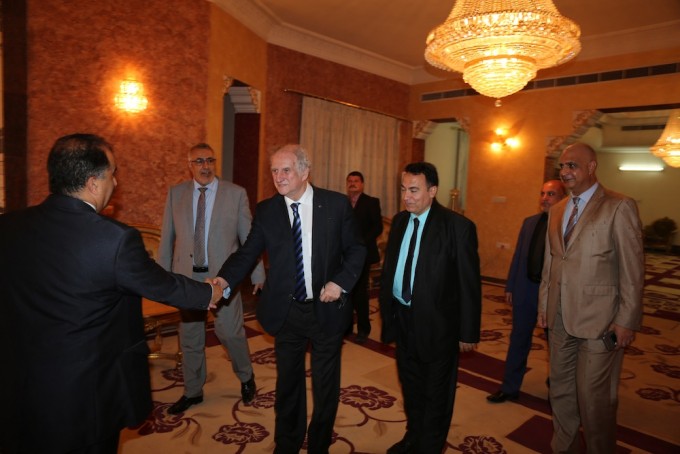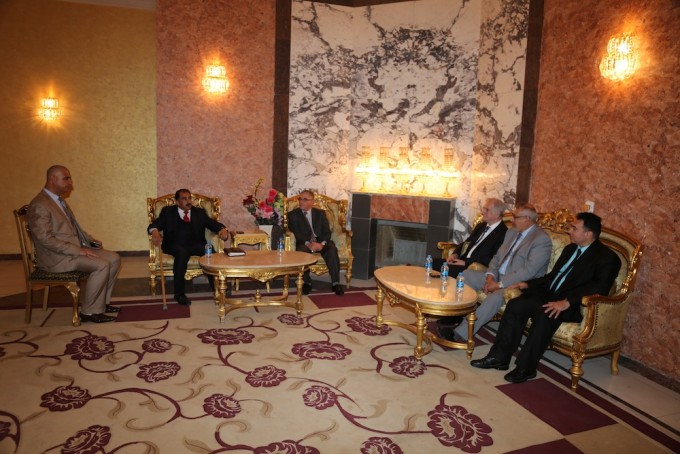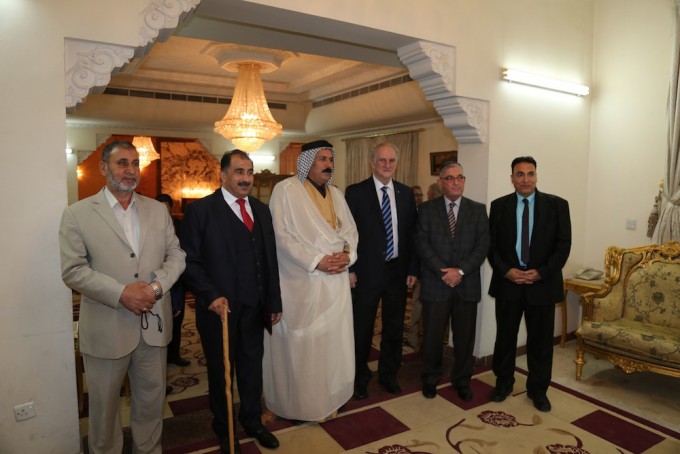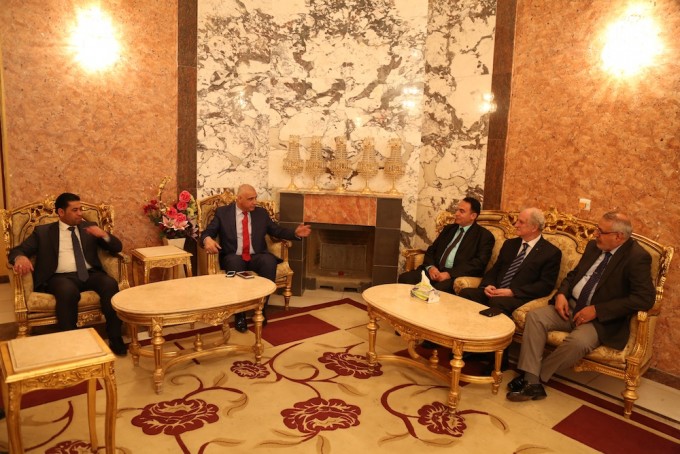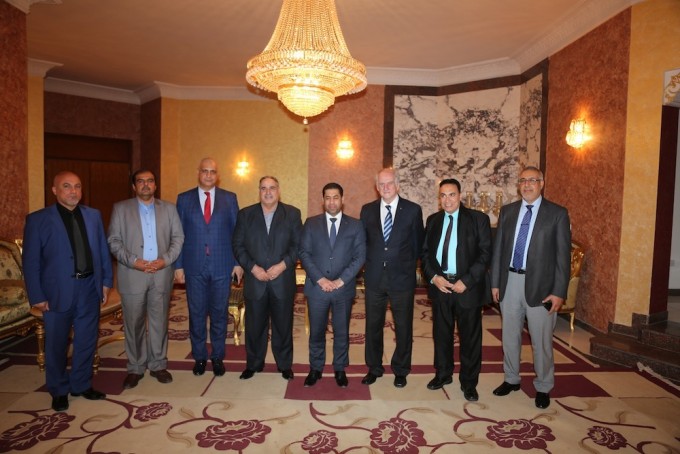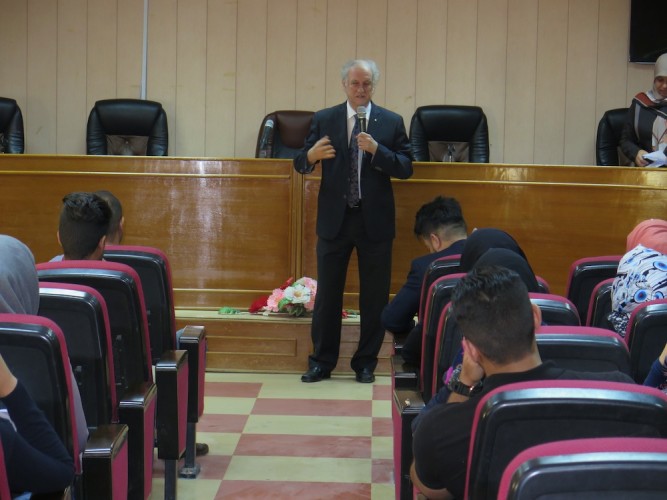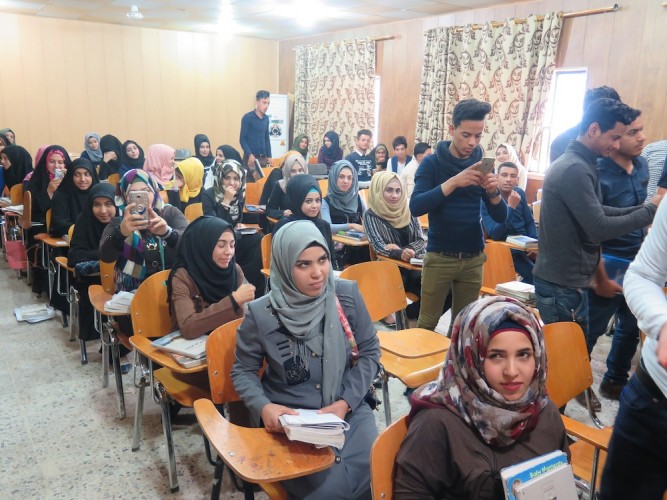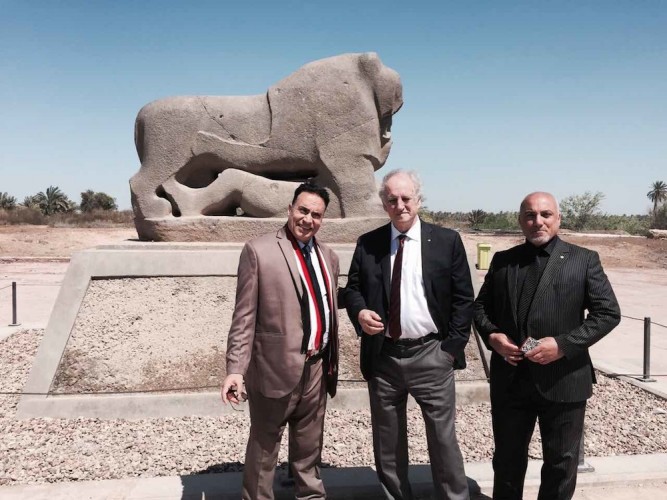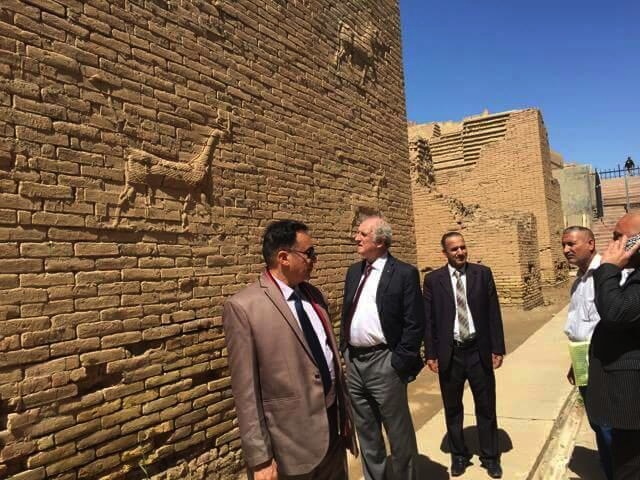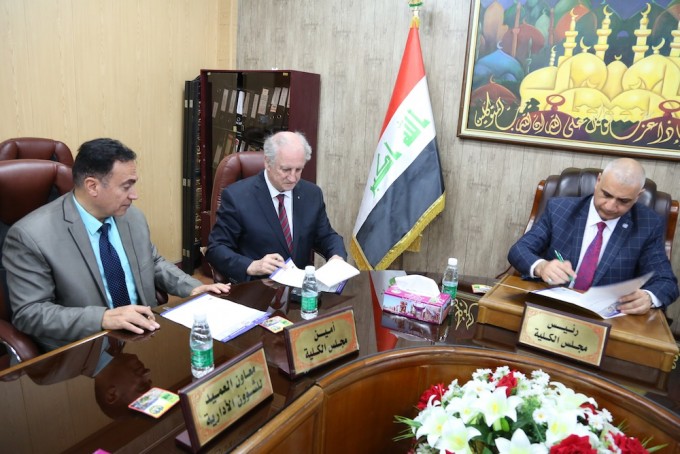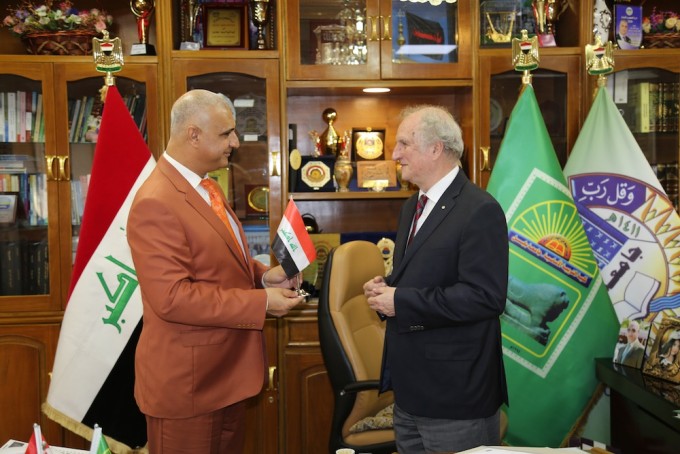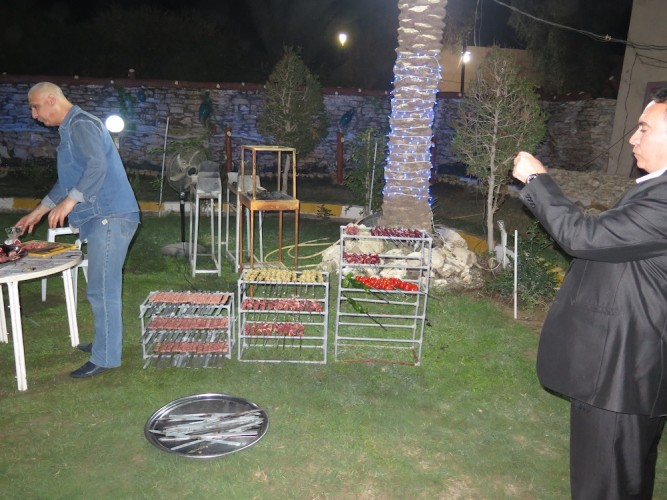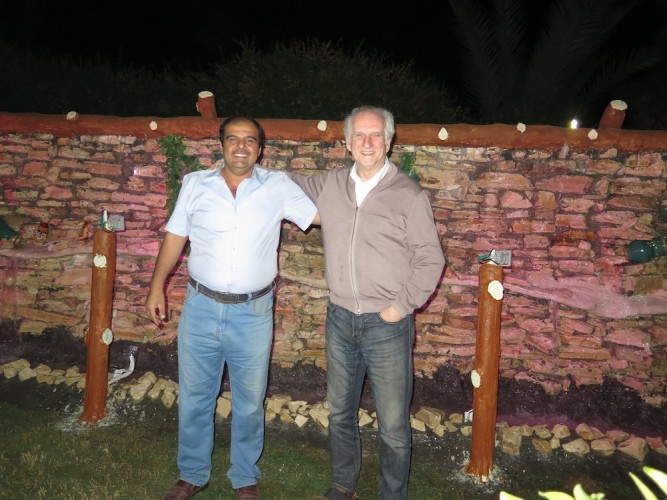Invitation from the University of Babylon for the Wisdom of Nations Foundation
Description of the trip to Egypt and Iraq and visits to the University of Babylon
March 27 - April 8, 2017
The Faculty of Basic Education of the University of Babylon in Iraq issued for me and Dr. Reda Abdel Haleem from Egypt (member of the Council of our Foundation) an invitation to a few days visits to sign a joint agreement on scientific and research cooperation between the university and the Foundation for supporting research on the disclosure of ancient knowledge and contemporary wisdom of nations .
I have to admit that my first reflex was doubt about the sense of such a trip, the more that the mass media in Poland and Europe present Iraq as a very safe place. In Poland, any reports from Iraq are usually terrorist attacks, fighting with the Islamic State, etc. All my friends advised me against such a trip "because you never know what would happen." Although Dr. Red, who visited Iraq several times, assured that the place we were to go to, or Babylon, is "completely safe", but there were still a lot of doubts. Dr. Red claimed that the Foundation may help the University of Babylon in establishing contacts with academic institutions in Poland and with specialists in such fields as: archeology, geophysics and conservation of monuments - because in the current situation such specialists are missing there.
Because of my fluctuations, as usual, I decided to advise our "friends from above" asking Basmat for advice. The answer was very beautiful and unambiguous:
"Andrzej is a good direction to act at a time when other roads have not yet been launched. The Babylon Group will give power and strength and allow you to sail and show your great commitment to this mission. Act a luminous path along with those who reached out with you and indicate the direction. There is a time this time .
No wonder that after such a message I decided to visit Iraq and the city of Babylon. Today I see that it was a very wise advice and a good decision.
I flew out of Warsaw on March 27 to Cairo to meet Dr. Reda (with whom we later flew to Iraq) and prof. Suzan El-Kalliny, dean of the Faculty of Arts of the University of Ain Shams. I remind you that prof. Suzan was together with prof. Mustafa Zayed (head of the Archeology Department at Ain Shams) in Poland in May last year and in Wrocław, an official scientific and research cooperation agreement was signed between the Wisdom of Nations and the University of Ain Shams.
Meeting with prof. Suzan El-Kalliny in Cairo
After a visit to Poland at the beginning of July 2016, prof. El-Kallina submitted an official application to a permanent commission at the Ministry of Antiquities in Egypt for permission to continue research in the Hawa necropolis region by the Ain Shams University while financing the Wisdom of Nations . According to prof. Suzan - the application was not considered due to the fact that the permanent commission did not accept the fact of signing such a financing agreement directly with the Polish Foundation. The contract will be considered only when another foreign academic institution is included in it.
During the meeting in Cairo Z, the action plan was discussed for the coming months when it comes to the promotion of our Foundation in Egypt and the possibility of acting in cooperation with the University of Babylon.
Visit to Abu Sir
Swiątynia and Pyramid in Abu Sir
The next day, Dr. Red took me to a historic place, located about 30 km from Cairo called Abu Sir, which means "Osiris House". It is an extremely interesting area that is currently closed to tourists, because it requires development, purification and renovation. A team from the Czech Republic has been working there for several years, but sponsors are clearly needed to clean at least part of the area, do GPR research and start excavations. Dr. Reda's dream is to include our foundation in these works - indirectly or directly. The Egyptian Ministry of Antiquity needs help for this kind of action.
Travel to Baghdad
The city of Babylon is located about 90 km south of Baghdad, which is why the only option was to travel by plane from Cairo to Baghdad and travel by car to Babylon. I arranged a visa to Iraq at the consulate in Warsaw based on an official invitation from the University of Babylon. Together with dr. Reda - who, as a member of the Foundation Council and a translator, accompanied me on this journey - we flew to Baghdad with Egyptian lines of Egypt Air on Thursday, March 29.
Stay in Baghdad
Because we arrived at Baghdad on Thursday, and Friday and Saturday are in Iraq for days off from work, the hosts decided to put us for 2 days in the five-star EL-Mansor hotel and show us the city. A special car belonging to the Dean of the Basic Education (College of Basic Education) was sent to the airport.
Hotel El-Mansur in Baghdad
I watched Baghdadu streets from the window of the car with great interest. It was my first trip to Iraq and I was very curious about my impressions. I was surprised by the fact of my total sense of security, despite the very visible presence of the Iraqi police and the army. On the way to the hotel, every few kilometers we were stopped at control points. The soldiers looked into the car, looked at us and we went further ... until the next control point. An undoubted facilitation was the fact that our driver had a special VIP pass from the dean. After showing it, the car was transmitted without any additional control. In this way we got to the El-Mansour hotel surrounded by concrete blocks.
In the evening our hosts came to the hotel: Prof. Dr. Mohammed al-Rubae, dean of the Faculty of Primary Education, Prof. Dr. QAIS HATIM HANI Department of ancient history at the University of Babylon, and Dr. Jasim Mohammed Hussein , representative of the Ministry of Education and Scientific Research in Baghdad.
I have to mention that my first meeting with representatives of the University of Babylon was in March 2016 at a scientific conference at the University of Zagazig in Egypt. Dr. Adam Szynkiewicz, dr Reda and me as the president of the Foundation took part in it. The report on this conference is posted on our website. During the conference, the first talks were held on the possible cooperation of the Wisdom of Nations with the University of Babylon.
Second day: visiting Baghdad. Life goes on with its rhythm
It would be good for Polish television and mass media in Europe to provide more positive information about Iraq from time to time. For now, we listen and see in the press and television almost exclusively about attacks, struggles with the Islamic State in Mosul, conflicts, etc. Meanwhile, it seems that in parts of the country not covered by war operations (including in Baghdad) life is going on with its normal rhythm. People want to enjoy life, walk the streets, visit cafes, walk, trade despite the bad things that are still happening around them.
Crossing the Tiger River on a wooden boat
Because it was Friday, the first day of the weekend, our hosts invited us to the old, historical part of Baghdad. We arrived by car to the Tiger River, we sailed to the other side of a small wooden boat as a "special attraction" of this place. We arrived at Al-Mutanabbi Street, starting with the monument of the world-famous Arab poet, whose full name is: Abu AT-Tayyib Ahmad Ibn al-Husyn al-Mutanabbi al-Kindi . Many of his works have been translated into over 20 languages around the world.
On Al-Mutanabbi Street in Baghdad
We mixed into a huge crowd of people, filling this area by passing by the stands where newspapers, CDs, souvenirs, cosmetics, etc. were sold.
We visited the Baghdad Culture Center and the Wax Figure Museum depicting everyday life in the former Baghdad. In one of the parks we encountered a team of Iraqi television "Asia", which did "live" with dr. Reda and with me. We talked about the goal of our arrival in Iraq, we told about the Wisdom of Nations and its goals.
In the park from the left: prof. Qais Hatim Hani, Dr. Jasim Mohammed Hussein and prof. Mohammed al-Rubae
It was an extraordinary experience for me and I thank our hosts and guides: prof. Mohammed, prof. Qais and dr. Jasim for familiarizing me with Arab culture and history.
On the street in Baghdad from the left: prof. Mohammed al-Rubae, Porf. Qais Hatim Hani, dr Reda Abdel Haleem, Andrzej Wójcikiewicz, Dr. Jasim Hussein
One interesting observation: compared to Cairo, where there are a lot of poor people who are easy to see on the streets - in Baghdad I did not experience such scenes. There were no people asking for alms or walking between cars to sell something. Once I saw a young man selling a CD with Arabic songs, but he was dressed very decently and did not look like a poor man. When I asked my Arab friends about it, they replied: "There is no problem in Iraq." I guessed why and I didn't ask further.
At the Wax Museum
The next day we left the hotel and went to Babylon by cars.
University of Babylon
This is a relatively young university that was created in 1991. In the ranking he ranks second in Iraq, after the University of Baghdad. It is placed in the Babylonian governor, about 90 kilometers from Baghdad over the Euphrate. The name of the university comes from the oldest civilization of the world: Sumerian civilization from Mesopotamia. The University of Babylon has 19 faculties, 73 cathedrals and has over 1,800 lecturers and assistants. At present, over 27,000 students are studying here.
Main building of the University of Babylon
Intensive plan of our stay
Together with Dr. Reda, we were placed in a guest house for VIPs, located at the university. The first look at the admission salon was shocking. The living room looked like a royal palace, not like a "guest shrine" of the university.
Admission salon at the villa for guests of the University of Babylon
The next day from the morning our time was completely filled. First, we had a meeting with JM Rector of the University, prof. dr. Adelem al-Baghdadi and members of the university senate. Prof. Al-Baghdadi greeted us and the principles of cooperation between the University of Babylon and our foundation were discussed.
Meeting with JM prof. Dr. Adelem al-Baghdadi, rector of the University of Babylon
It turned out that the city allocated an area of about 250 acres for archaeological research near its headquarters. The university may freely dispose of this area, but it needs specialists in various fields such as geology (georadar research), archeology and conservation of monuments to help. Poland has a very good reputation - especially when it comes to archeology and conservation of monuments, so one of the tasks of our foundation, it would be to find the right specialists in Poland in these fields of science and contact them with the university. We have established the following stages of research when it comes to the area mentioned, assigned to the university:
- Performing research with satellite archeology to examine whether there are some potential finds underground and determining the depth and place where they are. A member of the Council of our Foundation is Mr. Andrew Barker from England, who is on the board of the English company Merlin Burrows, Ltd. This company deals with satellite research (she performed research for us in the so -called "golden train" region, near Wałbrzych);
- In the case of determining the areas of interest - the University of Babylon expressed the wish of the invitation of a geologist, a specialist in Georadar to perform more detailed research. It is easier to make the Department of Geology at the University of Babylon the latest georadar equipment, purchased last year in Sweden with an antenna with a frequency of 100 MHz, capable of "looking" deep into the earth to a depth of up to 60 m.
- In the case of finding anomalies suggesting the existence of underground, worth to examine structures - the university could proceed to excavations and maintenance of the monuments found.
The university's task would be to cover all costs related to the stay of Polish specialists in Babylon, such as: accommodation, meals, fees, insurance, etc. The foundation's task would be to establish appropriate contacts and cover travel costs invited to Iraq specialists.
The official agreement between the university and the Foundation is to be signed after agreeing on its details and after the acceptance of the Iraqi Ministry of Education and Scientific Research.
Meeting at the University Hall
After talking to the rector and the university authorities, we went to the auditorium to meet students ... and again a big surprise. On the wall of the front hall we saw a huge banner announcing our visit with the name of the Foundation and my names and Dr. Reda. Dr. Red translated the content into English, I made it a translation into Polish. Here is:
Banner informing about our arrival (translation below)
"In accordance with our goal, for Babylon to return as a place of the World Culture Heritage, our Faculty of Basic Education of the University of Babylon, organizes under the patronage of JM Rector, Prof. Dr. Adel Al-Baghdadi, a conference on the role of the Wisdom Foundation supporting nations supporting archaeological research in Poland, with the participation of the President of the Foundation, Prof. Andrzej Wójcikiewicz from Poland and a member of the Council and a member of the Council Foundation, Dr. Reda Abdelhalem, general director of the three pyramids in Giza in the Arab Republic of Egypt.
Of course, there are some inaccuracies, but the very fact of creating such an advertisement and advertising was touching to me. I didn't think our arrival in Babylon would be such a unique event for the university.
Presidium during our lecture. From the left: prof. Qais Hatim Hani, prof. Assan Al-Jebury, Vice-Rector for international relations, Andrzej Wójcikiewicz and dr Red Abdel Haleem
For about 200 students and professors, we gave Dr. Red two short lectures. I talked about the mission of our foundation, its goals and previous achievements in the topics of pure energy and archeology. Dr. Red talked about research and excavations financed by our previous foundation in the area of the Mulle Pyramid in Hawar in the 2008-2009 season.
Aula for the university during our lecture
Aula for the university during our lecture
In the afternoon we went to the town hall, where we were admitted by the chairman of the city council (equivalent to our mayor), Dr. Raad Al-Jebora, in the presence of the university rector, prof. Al-Baghdadi, prof. Mohammed Al-Rubaie, prof. Assam al-Jebory, vice-reciter of international relations and prof. Qais Hatim Hani.
Meeting with the Chairman of the City Council, Dr. Raad Al-Jebora
Our conversation focused on the possibilities of supporting our Babylon city's efforts by our Foundation, so that the ancient city of Babylon (Ancient City of Babylon) would join the list of monuments of the UNESCO World Heritage. Wisdom of Nations Foundation has a signed cooperation agreement with the American Association The Academy for Future Sciences , whose founder and president is prof. Dr. JJ Hurtak (he took part in a conference organized by the previous Foundation on July 3, 2011 at the Roma Theater in Warsaw). This association is an active UNESCO member and this path is a chance that our foundation indirectly can really support this - in every respect, important and worth supporting - initiative.
At the Chairman of the City Council
Joint photo after the meeting. Chairman Dr. Raad Al-Jebora, second from the left
The next item on the program was a meeting with the Governor of the Babylon province (equivalent to our voivode), his Excellency Mr. Sadeq al-Sultani in the presence of prof. Dr. Kahtan Al-Jebora , vice-reciter of scientific and academic d/s, Mr. Ahmed Alkabit, a member of the city council and other professors of the University of Babylon accompanying us.
Meeting at the Governor of the Babylon province, Je Sadeq Al-Sultani. Governor first on the left
Joint photo after meeting the governor (in the middle, fourth on the right)
Lectures at the Babylonian University
The next day was a small surprise. Me and Dr. Reda were asked to conduct lectures for university students.
- What should I talk about? I asked
- What do you want ... - the answer was given. You have 45 minutes, speak English, without a translator, because the lecture will be for 3rd year students of English.
Lecture for the third year of English students
Photo of 3rd year of English students after the lecture
I thought that talking about excavations in Egypt (as suggested by Dr. Red) or about the energy of the zero point will not be the best solution in this situation. Because my specialty is personal development, the more interesting topic will be ways to improve memory, study and control emotions - because it can be useful to everyone regardless of the country, religion or belief system. So I decided to discuss remembering techniques using the right cerebral hemisphere and some emotion control techniques that I know from my NLP training. And so I stood face to face with a group of students at the University of Iraq. I hope that at least some of those present in my lecture will be useful.
A visit to the ancient city of Babylon
The ancient city of Babylon represents the civilization of Mesopotamia. It is considered the first civilized city in history. Initially, it was a small settlement in the Sumerian times about 4,000 BC. It was then known as Ka-Dingir-Ra-K3, i.e. the city of God. In the Akkadian times (about 3000 BC), Babylon was known as Babi-Il, i.e. the door of God. In the Old Testament he is known as Babil, while the Greeks called them Babyloia.
Babylon was recognized as a modern city in Sumer in the years 2112-2004 PNE became famous in the Amorian region (the first Babylon), because he became the capital of the first Babylonian civilization during the reign of his most famous king-Hammurabi (1792-1750 PNE). Hammurabi was recognized as a great judge and statesman due to success in the union of Mesopotamia. After the death of Hammurabi - Babylon weakened.
In the year 539 BCs conquered Babylon. He was also conquered by Alexander the Great in 331 BC, who made him the capital of his empire.
The first contemporary excavations in this area were carried out by the German mission in Babylon in 1899-1917. They were the beginning of research in excavations in this area. Unfortunately, many valuable Babylonian antiques, especially the famous Ishtar gate and Hammurabi's obelisk, have been taken to Germany and are so far in the Berlin Museum.
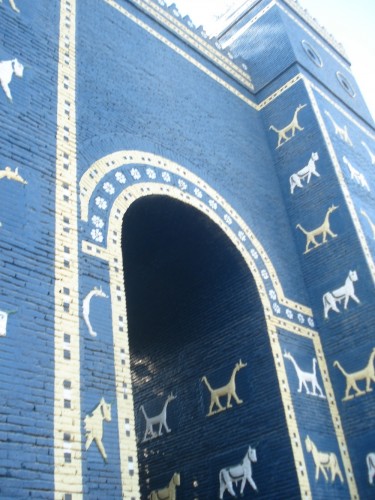 The city is entered through the Ishtar gate, the original of which is located in the Berlin Vorderasiatisches Museum in Germany. Our guide called her the "Marduka Gate", the god of war. There are 575 animal images on it on both outer and 48 meters inner wall. They represent the holy animals of Adad and God Marduk.
The city is entered through the Ishtar gate, the original of which is located in the Berlin Vorderasiatisches Museum in Germany. Our guide called her the "Marduka Gate", the god of war. There are 575 animal images on it on both outer and 48 meters inner wall. They represent the holy animals of Adad and God Marduk.
We saw a granite lion from a period of about 2,000 years BC symbolizing defeating the enemy (the lion "leaned over the figure lying under it"), bricks with inscriptions in the Sumerian language placed in the wall before about 3000 to 4000 years old I asked our guide what is written on one of these bricks? "This is the Sumerian language - I don't know what is written here," he replied.
Only small fragments of the old walls have survived to modern times. They were "supplemented" with new bricks so that the place looks like in splendor, thousands of years ago. This is an extraordinary tourist attraction, but very little tourists come here. Iraq is still considered a "dangerous place", so tourist offices are unlikely to organize collective trips here ... it's a pity.
Ishtar gate (Marduka)
We also saw a place where some of the walls began to fall apart and urgently requires repair and maintenance. A huge field to show off for monument conservators.
Before the Lion who defends Babylon against enemies. From the left: Dr. Reda, Andrzej Wójcikiewicz, dr Qais
What is hidden under the surface of ancient Babylon? What knowledge is deeper and hidden from our eyes? I asked myself these questions by passing a near places that are asking you to start studying them at least with the help of a georadar.
Before a fragment of the walls from the times of ancient Babylon (about 4,000 BC). You can see animal figures.
The city authorities want to include the entire area of the ancient city of Babylon in the UNESCO treasury as the object of the World Heritage of Culture. It is difficult to understand why it has not been done so far. Sumerian civilization is considered the oldest civilization on Earth, and Babylon is after all the place of its beginnings ...
Signing a letter of intent
On the last day of stay (5 April) Dr. Reda and I was again asked to conduct classes with students. I am at the Faculty of English, Dr. Red at the Faculty of Archeology. This time, students invited to my lecture were from different levels - from the first to the third year. During the lecture I was "covered" with questions from various fields. From: "How to control emotions during a quarrel between my husband and wife", "what do I think about people in Iraq", to "How do I like the traditions"? It was again a very interesting and unique experience.
Signing a letter of intent. The first dean of the Faculty of Primary Education, prof. Dr. Mohammed al-Rubae
In the afternoon a letter of intent was signed as an introduction to the agreement between the University of Babylon and the Wisdom of Nations . The letter contained a short history of our stay in Iraq and expressed the intention of establishing scientific and research cooperation in such areas as: archeology, geology, renovation and maintenance of monuments. On the part of the University, the letter was signed by prof. Dr. Kathan al-Jebora, vice-reciter of scientific and academic, prof. Dr. Mohammed Al-Rubae and prof. Dr. Qais Hatim Hania. On the part of the List Foundation, he was signed by Andrzej Wójcikiewicz and dr Reda Abdul Haleem.
Handing over by prof. Mohammed al-Rubae pennant with the Iraqi flag for the Wisdom of Nations
The possibility of signing a mutual cooperation agreement between the University of Babylon and the Ain Shams University of Cairu was also discussed, especially when it comes to archaeological projects in Egypt and Iraq.
Farewell BBQ
In the evening we were invited to a farewell BBQ to the private residence of prof. Heider El-Ammara , head of the Department of Geology at the University of Babylon. Here we met again-this time, however, in a very informal atmosphere-many professors from the University and representatives of the city of Babylon, including the governor, Mr. Sadeq al-Sultani.
Preparation of BBQ during a farewell dinner. Prof. Mohammed has undoubted cookbooks
With the host of the party, prof. Heider El-Ammary
Summary of the visit
I would like to emphasize here that the hospitality we experienced with Dr. Reda from representatives of the University of Babylon was absolutely unique and exceeded any of my expectations. I especially wanted to thank on behalf of our entire Dziekan Foundation, prof. Mohammed Al-Rubae and prof. Qais Hatim Hani for special care and care.
The level of hospitality and friendship that we experienced from the group of professors, city representatives, as well as from students and service was so unique that it is difficult for me to even express my gratitude for everything we experienced. We met wonderful people, we have made a number of new friendships and I only hope that our mutual contacts will actually begin to develop and cooperation between the Wisdom of Nations and the University of Babylon will result in specific activities.
Andrzej Wójcikiewicz
President of the Management Board
